A year post-therapy and it's taken some other endings to remind me what I learned
When the other-mothers come to your rescue
Hello, friends…
Writing my way into this month’s letter, I took a swerve and ended up somewhere else entirely. Planning’s all well and good but as in life so, too, on Substack. I wrote a Note about what I called stacking or scrapping which surprised me in its popularity given the tumbleweed most of my Notes tend to generate! This month’s letter follows…
It’s been quite the fortnight. More highs than your average, that’s for sure, so let me tell you about them first. I sang with the band I’m in. I took home an award for my writing. I watched as my elder daughter performed in her final school assembly having come so very far in the past six months, let alone the six and a half school years that preceded them. She exited primary school stage left without a backward glance, more than ready to hold her own at high school come August.
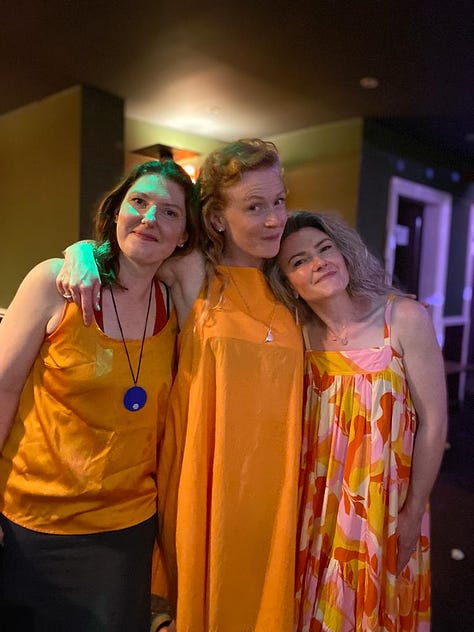
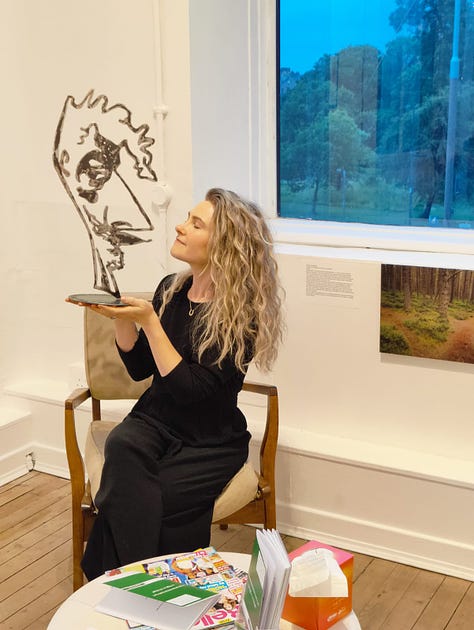
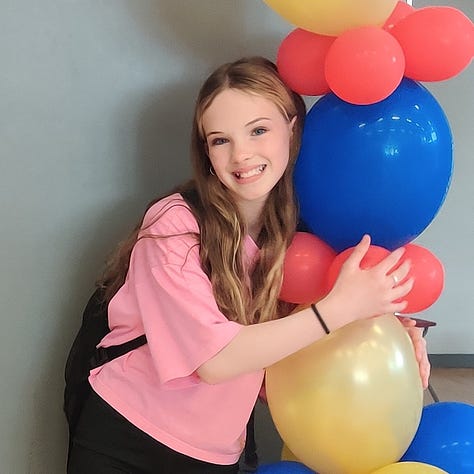
However…
Weeks of unrelenting heat here in Glasgow had long been disturbing my sleep. Fitful, clammy, vivid-dreamy night followed muggy, sweaty, brain-foggy day. The focus and energy I rely upon had evaporated and some days post-drop-off it was all I could do to make cold coffee after cold coffee and mooch about in a distracted haze… That is, before a jolt of OH FUCKness would propel me into action. I scooped up many a cascading ball at the last possible moment. Some, inevitably, fell.
Add to this the fact that, for me, such weather is tainted. A reminder of the climate emergency.
Yes, I rallied for the good stuff. I was determined to soak up events I’d long-anticipated and experience each in their fullness. But as soon as the week was done and the children skipped off the school bus for the last time, I noticed a blackness bedding in.
It’s been some time since I thought much about my therapy or felt the need to put the learnings into practice with urgency. But last weekend I was worried for my mental health afresh: overwhelmed by the small stuff, bone-tired and borderline hopeless. In an attempt to nip it in the bud, I returned to what my therapist taught me and looked for the dis-ease in my body. Located it in my chest. Gave myself compassion for the emotions and sensations that threatened to dominate before taking stock. There was, of course, no real threat. Nothing amiss.
Nothing to point at, other than, perhaps, the prospect of seven unstructured weeks ahead.
I love being with my children. But I also love routine. I love knowing when I’m expected to be ‘on’ (whether that be for them, for my work or in my caring life) and when I can make autonomous choices that enable me to do all the ‘on-ness’. Like going to the gym. Finding flow in my writing. Singing with my friends. So before it had truly even started, I had to acknowledge that in order to be fully present with the girls, I would have to make time for what I need. Incidentally, a few post-dinner naps, some supportive exchanges with friends feeling similarly about the next few weeks and a change in the weather later, I felt the dread beginning to lift.
FYI, it wasn’t always this easy to articulate or even identify my needs and I acknowledge my privilege in being able to make the necessary adjustments to help me to cope.
Nor was it quite that simple this time…
I’ve had to check in with how circumstances beyond my control are also colouring my view of the days, weeks and months ahead and, with that, acknowledge that another change in my daughter’s life is hitting me hard. Because though I’m taking the necessary steps to right my own ship, I can’t ignore the fact I’m caught in the swell caused by the vessels around me.
On Thursday, her best friend emigrated to Canada. It came as no surprise: her family’s move had been long in the planning. Derailed first by a terrible accident then COVID then cross-continent bureaucracy, the seven-year-old they had been relocating with is all of a sudden nearly a teenager.
Over the past few years, this girl has gelled with my daughter in a way no other friend has yet. They are their weirdest selves with one another. They squabble, giggle and communicate more with crazy eyes alone than we could ever hope to understand. I wrote about them for a competition
ran back in May which you can read again here:I am proud to know that she has been happy here with us. Able to let herself in the back door. Laugh with us. Roll her eyes at us. Tolerate this rambunctious household while hers has oftentimes been quiet and stress-filled. I’ve fed her, taxied her and cleaned up her middle-of-the-night sick, the stains from which we’re stuck with. I’ve given her bags of shopping to carry, sent her out for milk and asked her to move her trainers from the foot of the stairs. In short, she’s been folded in.
Caring for children is such a slippery thing. You’re needed and then you’re not. Not close enough then too close. Wanted then rejected. It’s a dance that only grows more complex as they do. Children, too, are slippy. In fact, they are wont to slip beyond your grasp before you’re ready to let them go.
Like the washed-clean avocado stone I ham-fistedly attempted to skewer with a pair of corn-on-the-cob forks for my younger daughter the other night, so hopeful was she that we might grow our own. As I type, I can almost touch it, sitting there on the kitchen window ledge suspended over a whisky glass half-filled with water. I’ve never done this before. Will I watch for days, weeks or months seeing nothing much happen only to wake one day and discover a white root bursting through?
On Tuesday, there was a rushed drop-off at her flat expecting that we’d see her on Wednesday for the last time. There was no time for hugs. She wore the friendship ring we’d bought the pair of them over the weekend and said she’d appear in the morning. Her parents would want space and time to finish up at the flat before relocating to a hotel for the night before their early flight on Thursday morning. We could save our emotions for another day yet.
Helping the two of them to master a Polaroid camera earlier that day, I’d been minded of the final days of psychotherapy where the ending is planned-for. Often months in advance. There is time given to work through all the messy, complicated feelings that endings throw up so that when the time does come to say goodbye, both parties can walk away feeling that some sort of resolution has been reached. The work is never ‘over’, but this stage of the healing has reached its natural conclusion.
And we’d always known A would leave. It hadn't been avoided; we'd faced it head-on as much as we were able to; us adults living far more in the past and the future than the children. So, when for reasons I’m still processing, we didn't have a chance to say goodbye on Wednesday, it was a blow. The sudden change in plans left the girls as hysterical as one another. I could hear it all playing out as I listened into their conversation from the sanctioned distance.
As the days have rumbled on, I continue to be upset for my daughter and the friendship that cannot be the same conducted over Snapchat across five timezones. I’m upset also for A, who has landed in a different Canadian town from the city they thought they could afford half a decade ago, hoping she’ll settle soon. And I’m upset for me.
Do I have a right to this feeling?
Grappling with this, I sit quietly with the imaginary therapist-voice in my ear. A woman who occupied a certain ‘other-mother’ space for me. What would she say if I’d turned up this week full of this emotion? Would she minimise? Tell me that it wasn’t my loss? Or would she give me the space, time and permission to work through my feelings without judgement? I’m sure you can draw your own conclusions.
All of this has led me to consider some of the other-mothers who did a lot of the looking after when I was growing up. Might they have felt similarly bereft when friendships crumbled suddenly or circumstances changed? I’m thinking about the many who passed no comment as I rooted in their kitchen cupboards for snacks. The one who petitioned the school bus company while my mum was in hospital to allow me on with her daughter to make Friday afternoons easier. The one who gave up her double bed for us on each of the nights I stayed. She’d sleep in her daughter’s single bed in the box room and her husband was relegated to the couch. For years.
I haven’t had cause to think about these women in decades. Maybe you haven’t either. Maybe they knew they were needed, like they often were during my childhood? Or maybe life was less complicated, and your own mother fulfilled that role for a friend you had? Or, better still, perhaps it was truly equal: your mum and hers both offering the same regardless of whose house you were in. I’d love to know who they were for you, these other-mothers, and all the ways in which you were folded in.


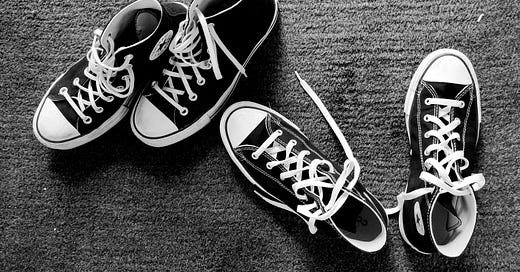


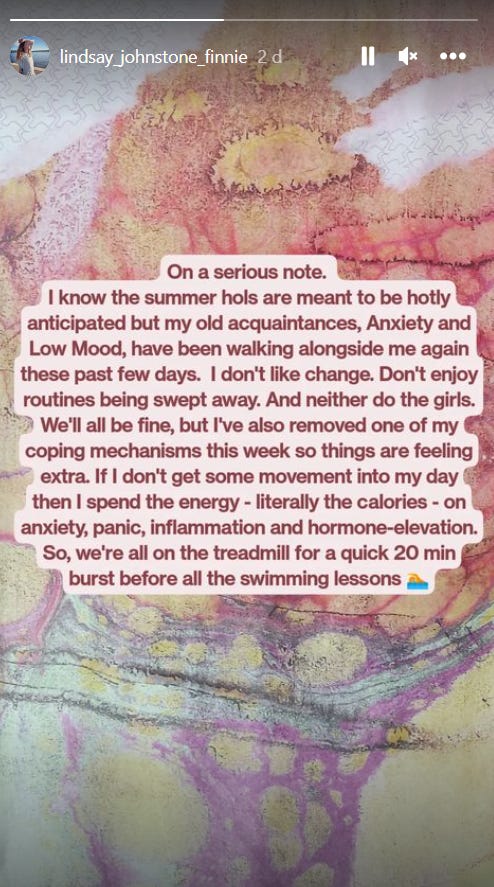



A lovely article. For what it's worth, I think you have a right to feel the loss! Seeing as A was folded in, as you say, then it's totally valid. I also really understand your anxiety about loss of routine and rythem, maybe you find a new one for the next 7 weeks?
My other mothers were my sisters and I do think about them all the time! They are much older than me, were built in babysitters, and gave me the space to be myself because we had immigrant parents we had trouble connecting with.
I’m sorry about your daughter’s friend moving so far. It’s so hard to see our children go through real life emotions that we know are necessary in life to build grit but it still isn’t easy to watch.